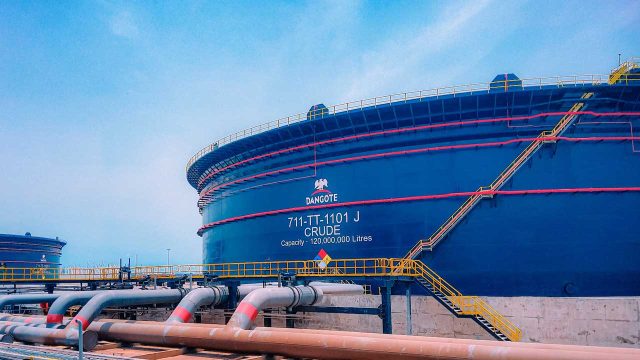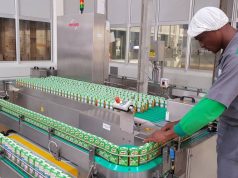A group, the Natural Oil and Gas Suppliers Association of Nigeria (NOGASA), has called on the federal government to intervene in Dangote Refinery’s plan to directly supply petroleum products to end-users, citing potential job losses and industry instability.
Benneth Korie, the president of NOGASA, made the call while speaking on Thursday at the association’s Annual General Meeting (AGM) held in Abuja.
On 15 June, the Dangote Petroleum Refinery announced a major initiative to transform Nigeria’s fuel distribution landscape. At the time, the company said that effective 15 August, it will begin distributing petrol and diesel to marketers, petrol dealers, manufacturers, telecoms firms, aviation, and other large users nationwide.
It explained that the strategic programme is part of its broader commitment to eliminating logistics costs, enhancing energy efficiency, promoting sustainability and supporting Nigeria’s economic development.
Mr Korie expressed concerns that the move could disrupt the oil and gas industry, putting thousands of jobs at risk and jeopardising existing business models of suppliers nationwide.
“We are not against Dangote Refinery, but we believe that direct distribution will disrupt the existing system and cause more harm than good. We plead that Mr President intervene in this matter by telling Dangote to slow down, go by the rules of the game, focus on refining products and selling to marketers, who can then distribute to end-users,” Mr Korie said.
He noted that Dangote Refinery’s decision to venture into direct distribution could be detrimental to the industry, citing the example of the Nigerian National Petroleum Company Limited (NNPC Ltd), which faced similar challenges when it started direct distribution.
He urged the government to advise Dangote Refinery to reconsider its decision and engage with stakeholders in the industry.
“We call the attention of the government to intervene by telling him to allow people to do their business. We have over 50,000 filling stations in Nigeria, and if Dangote Refinery takes over direct distribution, it will be difficult to meet the demand. This will lead to scarcity and insecurity, which will affect the entire system,” he added.
Also speaking, the National President of Petroleum Products Retail Outlets Owners Association of Nigeria (PETROAN), Billy Gillis-Harry, argued that Dangote Refinery should be competing with global refineries, not operating as a distributor in the downstream sector.
“This massive refinery, one of the largest in sub-Saharan Africa, is expected to satisfy domestic fuel demand and export surplus products,” he said.
He added that PETROAN has previously raised alarms about Dangote’s intentions to dominate the downstream sector, citing concerns that the company may leverage its market power to fix prices, limit competition, and exploit consumers, much like it has done in other sectors.
These tactics may include a pricing penetration strategy, where they reduce prices to capture market share, aiming to force other filling station operators to quit the market. This could lead to a massive shutdown of filling stations across Nigeria, resulting in widespread job losses.”
He noted that the introduction of 4,000 brand-new Compressed Natural Gas (CNG)-powered tankers by Dangote Refinery poses a significant threat to the livelihoods of thousands of truck drivers and owners.
“While CNG trucks may offer a lower cost of transporting petroleum products, this shift could lead to widespread job losses in the industry. It is obvious that Dangote plans to gain full monopoly of the downstream sector, which would enable the company to exploit Nigeria’s petroleum consumers.
“This could lead to higher prices, reduced competition, and decreased economic efficiency. We hereby call on the Authority Chief Executive of the Nigerian Midstream and Downstream Petroleum Regulatory Authority (NMDPRA) and the Minister of State for Petroleum to put in place price control mechanisms to prevent any form of monopoly. Competition should always be encouraged to protect consumers and promote economic efficiency,” Mr Gillis-Harry said.
In his remarks, Ikeagwuonu Ugochinyere, chairman, House Committee on Petroleum Resources (Downstream), acknowledged the challenges facing the industry.
“We all know about the inefficiencies in our distribution networks, the ongoing problem of adulteration that harms quality and damages machines, the annoying supply bottlenecks that lead to shortages, and the tough logistical issues of moving products across our wide country. These aren’t just things we talk about; they are real problems that affect people’s lives and our nation’s economy,” Mr Ugochinyere said.
Mr Ugochinyere, represented by Member, Committee on Petroleum Resources (Downstream), Ahmed Saba, assured that the National Assembly is aware of Dangote Refinery’s recent move into distributing and assured that the matter would be carefully examined.
“We are particularly paying attention to Dangote’s recent move into distributing and selling products and how it might affect current distributors. This is a big change, and I want to assure you that we are carefully looking into this situation. Our goal is to create a situation where everyone wins, following the rules set in the Petroleum Industry Act (PIA),” he said.
He explained that the PIA is a huge law, showing the country’s shared dedication to fixing and boosting the oil and gas sector.
READ ALSO: Dangote Refinery discontinues lawsuit against NMDPRA, NNPC, others
“The PIA provides a clear plan to improve distribution, make things more transparent, and strictly ensure product quality from start to finish. Beyond the PIA, we are always looking for new ways to improve, focusing on using technology for better tracking, simplifying rules, and investing in key infrastructure to make the whole supply chain work better,” he added.
However, he said, the government efforts alone aren’t enough.
Mr Ugochinyere said for the downstream sector to grow sustainably and work well, there is a need for strong teamwork and shared responsibility between government bodies and private businesses.
“Your ideas, your investments, and your new ways of thinking are vital for change. By working together, we can remove existing barriers, create a fairer and more competitive environment, and ultimately provide a more dependable and efficient system for distributing petroleum products to all Nigerians,” he said.









